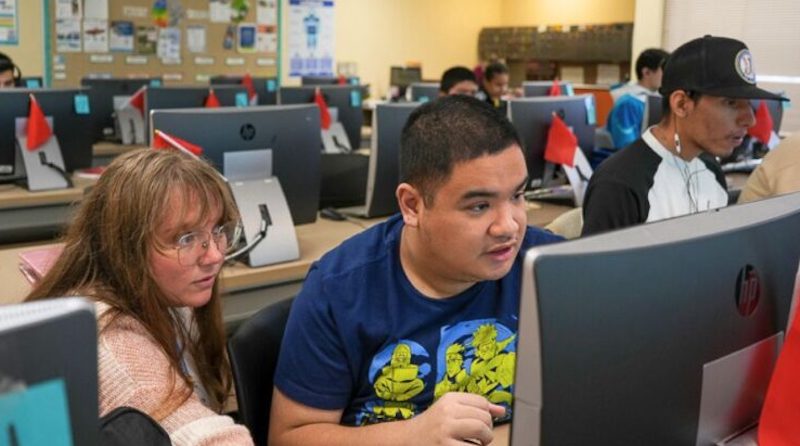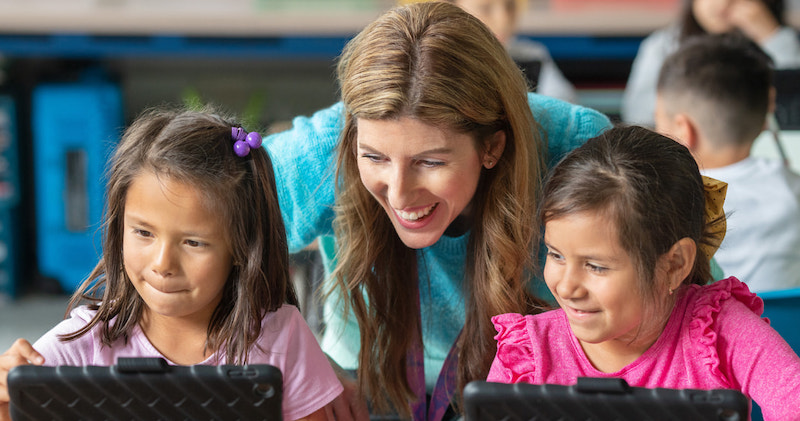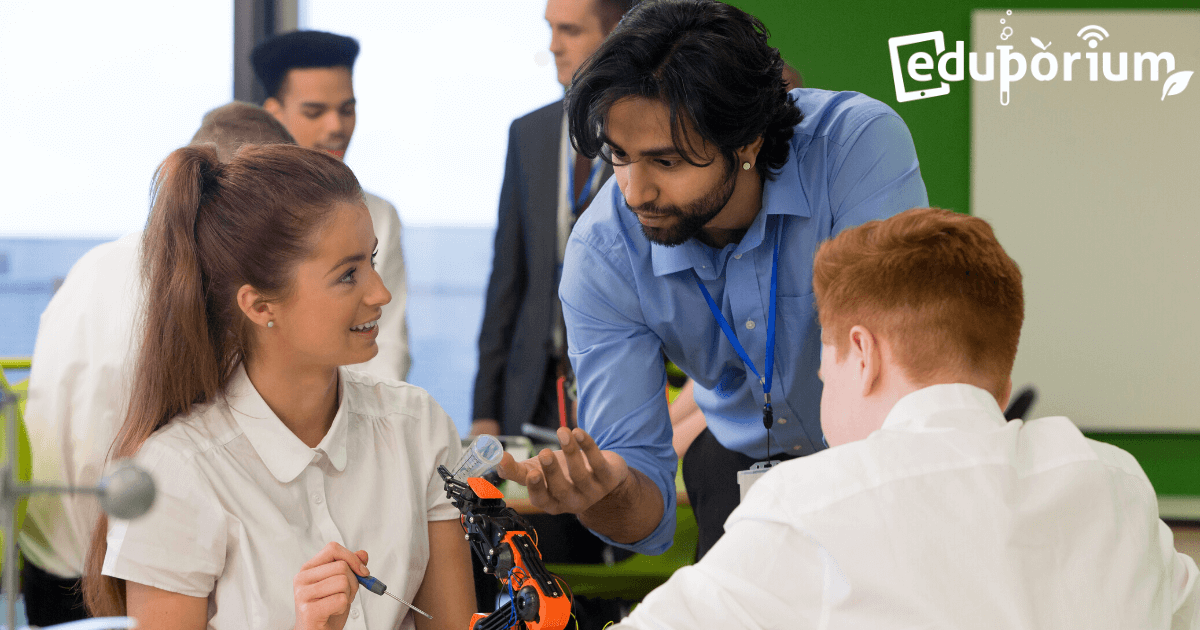Ordering a bunch of new technology and then throwing it into your classroom isn’t necessarily a great idea. Students might all be excited, but it is highly unlikely that them or their teachers will know how to make the most of this technology, or even know how to use it at all. With advances in EdTech and a greater focus on using it to prepare students for the future, educators are being given more responsibilities and some are even taking on a new role. One of those roles is that of a tech coach, which are becoming more and more common in K-12 schools. Let's discuss that importance of tech coaches, what tech coaches should do, and what makes a tech coach effective!
Things Every Tech Coach Should Do
Tech coaches are integral members in many schools and their efforts impact both educators and students. Like when taking on any new jobs, however, there are some basic characteristics that tech coaches should possess for success. They should be highly motivated and “go-getters” who aren't afraid to take charge of their professional development. They should also be willing to rely on various peers for feedback about any specific tech tools or integration strategies. The educators who will be using technology within the school’s classrooms are a great source for this feedback and so are tech coaches from other grade levels and other schools. Finding little tips or tricks for tech integration is something you should not overlook. Good EdTech coaches tend to take advantage of everything they can to make the integration process run more smoothly.
One of the most effective things your tech coach can do—whether they’re new to the profession or not—is to find a professional learning network and join it. Online groups offer invaluable advice and insights for the best ways of educators using technology and their time. Over time, these PLN’s also grow and it’s great for tech coaches to rake in advice from many different sources. This allows them to absorb varying viewpoints and make informed decisions for how they want teachers and children using technology. Tech coaches are going to have questions and in being able to turn to the group of peers, who, to be honest, have previously had the same questions, they'll often find extra comfort. Twitter is also great for finding helpful content and specific hashtags can help tech coaches discover ideas or share successes.
In addition to social media, there are plenty of online blogs or podcasts for coaches that'll help perfect their craft. One of the greatest ones around is the TeacherCast podcast which provides educators with relevant advice for all stages of tech coaching, including podcasts, videos, blogs, newsletters, and more! With more digging, you could find tons more content, and likely something that can answer the specific questions you have. Finally, it’s important for tech coaches to not only ask questions, it’s important for them to share what they know! Leading the implementation of new technology in the classroom is important, and tech coaches have the power to offer insights to others that can help them achieve the same success. We’re just starting out with tips for tech coaches, but hope this is a valuable foundation with some inspiration!

EdTech Coaching in Today’s Classrooms
School leaders know they need to use technology effectively to prepare students for the digital future. This isn't a bad school of thought, but this thinking may lead to educators rushing to implement new tech tools without researching, vetting, or using them on a trial basis. Not every EdTech tool will enhance engagement for every child, but just hoping it sticks also is not ideal. Teachers need support—maybe not at every single stage—but EdTech coaches could play key roles in ensuring they do this efficiently and effectively. Many of the technologies children use obviously entail the technology itself and, many times, it'll require compatible devices as well. Coaches can research technology in advance, try it on their own, and learn the nuances of integrating it. This saves teachers time, having to figure things out, and troubleshooting on the fly, which is obviously very helpful.
Even though we are unsure exactly what it'll be like, today’s children need to prepare for the future of work. So, this also means that today’s teachers need to be prepared to educate today’s students for the future of work. All teachers—whether they’re technology natives or brand new to this side of education—can benefit from coaching. Coaching for teachers is typically a short-term engagement, during which they focus on the teacher’s weaknesses and address that to make him or her feel more comfortable with using technology in the classroom. Tech coaches are also very flexible and can work more directly with any teachers who need extra guidance. Tech coaching often helps improve on teacher performance when using technology in their classroom and remembering that objective is important for both the coach and the educator or educators.
Those benefits educators can gain from working with tech coaches are far reaching and there are many we could mention. When teachers know how to use different kinds of technology, they get to enhance lessons by deviating from their traditional lecture style and offering students more excitement and opportunities for engagement. Also, today’s educators expect students to collaborate, so they can do the same by working with tech coaches. Tech coaches are also great for helping teachers set new goals and empowering them to help kids create new things. When teachers who are working with EdTech coaches are non-judgmental, patient, and approachable, they can learn to use classroom technology. And, these students can develop 21st century skills, including active listening, perseverance, problem solving, open mindedness, empathy, and more. It all starts with the teachers and their enthusiasm for being coached.
Why Tech Coaches Should Collaborate
This may go without saying (and we've touched on benefits of collaboration already) but we’ll get more into that now. First and foremost, when any educators collaborate, they are able to take advantage of a frontline support system that’s anchored by other teachers who have been in a similar situation. While a school may only have one tech coach who’s dedicated to helping out every teacher and student, they can certainly use the power of your PLN or collaborate with the tech coaches for surrounding schools, towns, or districts to maximize what they learn. Peer mentoring is often effective with students and it is just as legitimate among tech coaches. When it pertains to implementing new technology in instruction, tech coaches will obviously those leading the charge. As leaders, they'll need to be willing to access every available resource to make the process more smooth, including collaboration.
Tech coaches often support instruction and learning, so learning how to effectively communicate with kids and educators is important. Since many tech coaches are responsible for coaching children, teachers, and administrators, working with other tech coaches can help them learn different ways of communicating and instructing each group. What works with one set of people might not be as effective with another. Because tech coaches have a ton of responsibility but no real authority, working with other tech coaches could help them learn what to include in their instruction or what to potentially omit. And, sometimes, this technology breaks down in the classroom or the teacher can’t figure out how to work it correctly. This is when having multiple coaches could truly help. After all, two heads are definitely better than one when troubleshooting and problem solving.
Ultimately, EdTech coaches aren't different from classroom teachers in the sense that they work and learn from others whenever possible. Collaborating with other tech coaches allows you to share what you know, find ways to better support children, find ways to better support teachers, and find ways to better meet all district goals and EdTech expectations. Collaborating even helps challenge tech coaches to discover new ways of enhancing their craft. Plus, it gives them the chance to learn about new resources and, of course, share subtle tips and ideas. As such, collaboration, a lot of the times, is really as simple as having a quick conversation or a brief weekly meeting to discuss new ideas of using tech effectively. Remember—others have been there before and it’s more than okay to seek out wisdom from those who have!

Providing Leadership and Direction as a Tech Coach
We don’t want to minimize the role that tech coaches play in education today, but the truth is that they will usually wind up being more of facilitators than game changers in the classroom. This is partly because it is their role to enhance learning rather than directing it completely. Also, classroom teachers remain largely in charge of the overall experiences of their students. Despite this, however, tech coaches often still influence learning goals and, of course, using technology effectively can make them possible. So, coaches still must act like leaders while wearing many hats and guiding both teachers and children in using technology. Skills like leadership are important for tech coaches because they're able to set the tone for enhanced classroom instruction and also bring to fruition the fundamental beliefs and goals set at the administrative level.
To guide teachers and students in the right direction when they’re using new technology, tech coaches can also be leaders. Without being demanding or confrontational, it’s important to create this among educators and faculty in and out of the classroom. In the classroom, they also need to be more than simply a teacher and provide help as needed—at all stages of technology adoption. And, as teachers begin to successfully implement new EdTech tools, coaches can highlight these accomplishments so those involved feel proud. Ultimately, there are a lot of ways tech coaches can be leaders, but these are some of the best ways they can bring that leadership directly into the classroom. So, now, we’ll focus on other ways they can lead.
Not only are tech coaches leaders when it comes to all technology implementation, they're also leaders for the school’s administration. This helps them become the voice of the classroom, the voice of students, and of innovation all in one. It also tends to lead to them becoming that link between the educators of a school and the administration. EdTech coaches should also be leaders within the community and be excited about offering training, information, and parent nights so that all members of the school community stay informed about the great things that are happening in each classroom and excited about new opportunities that kids are going to have. Finally, they could be curricular leaders and advocate for what to include in the school’s requirements or what to omit. It might seem challenging, but leading is pretty easy for tech coaches who'll want to give students the best experience.
Characteristics of Effective Tech Coaches
When the role of tech coach first originated in schools, there weren’t that many around. Fast forward just a few years and, now, that number of schools with tech coaches far outnumber those that don’t. Technology has obviously become a big part of 21st century education and school leaders aren't waiting around when it comes to finding people with skills to prepare their students for the future. What are those skills, though, and what makes a tech coach effective? Should they work more closely with educators or students? Well, there’s no wrong answer, but tech coaches usually work more with teachers and can make a huge impact when it comes to getting teachers comfortable with new tools. How they do this is also very important.
What tech coaches learn in their own training goes a long way in shaping how effective they are in schools. Tech coaches are at their best when they can learn how to personalize the instruction they're giving to their teachers. Learning their individual needs and creating specific plans goes a long way in easing the process for classroom educators. Tech coaches also have to be a bit intense and demanding in order to ensure that the teachers they are working with end up knowing enough about the new technology tools. After all, they are implementing them to better prepare kids for a future that’s heavily reliant on technology. This helps the teachers easily become confident in the tech coaches they are working with and also more likely to confide in them, helping the flow of idea sharing and building comfortability at the same time.
Many school leaders also like to find tech coaches who have previous teaching experience—ideally at the same school. Plus, tech coaches need exceptional communication skills since they will be spending most of their time instructing educators and students. In fact, success is often largely about this ability to foster meaningful relationships than it is about being highly technical. So, being an effective tech coach entails a lot of work and knowing where to go in delicate situations. It is also a lot about being a leader—something that is often overlooked when bringing in new technology. When all is said and done, however, technology will continue to play a huge role in education. And, the technology coaches who work with their educators are among the ones who need to be thanked.
For the latest EdTech, STEM, and 21st century education news, follow us on Twitter and Instagram. Like us on Facebook, too, or sign up for our newsletter for our latest product announcements and offerings. If you have an idea for an Eduporium Weekly theme, send us a message on social media or comment below.



